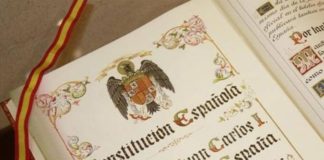Iñaki Lopez de Luzuriaga
05-11-2017, ZUZEU
Abstract:
The “Basque way”, that is the naming chosen to oppose the so-to-say ‘crazy’ path taken by the Catalans, turned the baddies, to make their stand towards independence, as opposed to… the Basques, ironically, the ‘goodies’ now in the Spanish media and government! The phrase is intended to mean bilateral, consensual. This comes at the moment when the Spanish police charged against voters in the independence referendum of 1 October, with the Spanish constitutional, coercive law crystallizing in a full-blown crackdown of the democratic exercise. The present-day Spanish nationalist government has made the Constitution and Law the be-all and end-all of the Spanish politics, the embodiment of ‘reason’ and democracy.
The idea of the Spanish law towering over us conjures up the moment when the western Basque provinces of Alava, Gipuzkoa and Biscay lost their Basque laws and institutions back in 1876 following a Madrid law tailored by the pro-slavery, pro-torture rising personality Canovas del Castillo, a father figure of Spanish constitutionalism behind the formula of the two-party alternation in office or turnismo. The peninsular Basque Country was occupied since early 1876 by a Spanish army up to 200 thousand strong (at least for 3-years).
The politician and Spanish premier made it clear to the Navarrese MPs in the Madrid parliament that the 1841 Navarre ‘Consensual Law’, as some Navarrese wanted to believe, meant nothing to him, “a matter of force becomes law, since force is law when it generates a State”, he went. Sabino Arana, a founding figure of Basque nationalism tasted first-hand the Spanish constitutional recipe, paying dearly for his support to the freedom of the Cubans in late 19th century, and kicked straight into prison for that, being released only in his death throes.
Canovas del Castillo is physically death, still he left a deep impression in Spanish nationalism. By 2017 the Spanish government continues its breach of the 1979 limited autonomy of the Statute of Gernika after 40 years, a legal infringement (turned ordinary), ironically a serious violation of the very Spanish Constitution it defends as a totem, ‘the be-all and end-all’. So summarizing, what was the bilateral Basque way about?



